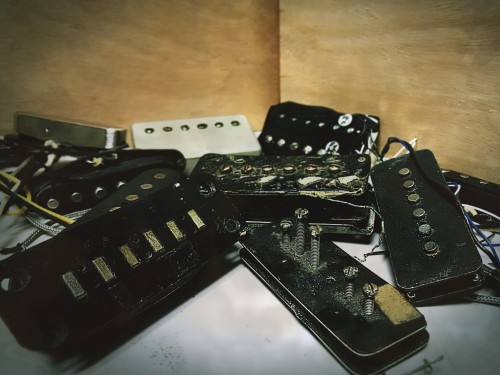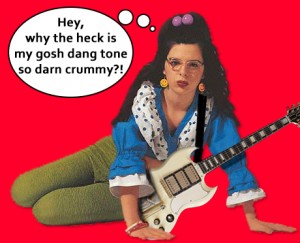We get asked all the time, “Why does my old pickup sound dull?” There are many reasons the tone can suffer on vintage pickups.

We can’t resurrect or improve every beaten, tired, old pickup that we come across. Some of them, like the ones seen above, are just too far gone. Only a complete rebuild, with brand new parts could bring them back to life, but at that point, you may as well just replace it! You can’t shine a turd, as they say — and even if you could, you’d still just have a shiny turd. But, just maybe, your dull sound isn’t the turd you thought it was, so in this edition, we’ll address the possible causes and potential solutions.
The number one reason for bad sound is from what is known as an open coil. This is where there is a small break in the coil towards the center of the pickup. This doesn’t necessarily create a dull sound; it allows the coil to function through capacitance. It’s similar to the sound you get if you wire a capacitor in series between the hot lead of the pickup and the output jack. The capacitor will only pass high frequencies, so the pickup winds up sounding very bright with no midrange or low end and the output is greatly reduced. The way to test for an open coil is to set your ohm meter at its highest setting and if the coil is open, you’ll get a reading in the millions of ohms and it will rapidly go down lower and lower until eventually you won’t get a reading. In this instance you would need to get the pickup rewound.
Something that occasionally happens with Fender pickups that have magnets for pole pieces like a Strat, because the magnets are in fairly close proximity with alike polarity. After time, the motion of the magnetic field can degauss the magnets by about 20%, so you will get a little less brilliance. It happens so slowly you’d likely never notice it and most people like the sound of old pickups. However, on some guitars, like a Rickenbacker with Horseshoe magnets, those magnets are not permanent and can degauss down to having no noticeable magnetism. Those need occasional re-gaussing with a magnetizer. I have also seen vintage Horseshoes that had some sort of manufacturing defect where they wouldn’t take a charge again. Normally, anything made after WW2 will have permanent magnets, so degaussing to the problem point isn’t an issue.
I have run into several 1940s Gibsons where the braided lead wire corrodes enough that resistance becomes higher per foot. That extra resistance bleeds off treble. On these instruments, the best thing to do is remove the original wiring assembly in one piece and make a new one. This will restore the tone but could affect the vintage value.
I have had guitars shipped to me from Hawaii that had so much corrosion on the electronics due to high humidity that they didn’t have any signal at all. Switches, pots, output jack and wiring can all corrode, which at best will reduce your treble and at worst will kill your output.
One other item is thick metal covers or metal covers made of certain materials that can cause enough problems with the magnetic field to reduce treble dramatically. Metal dog ear covers like those on Casinos give those guitars a particular sound that has less treble. Even aluminum pickguards like on late ‘50s Strats and Jazzmasters reduce treble somewhat.
Pot values can affect your tone too. 250K pots can bleed off too much treble; higher values preserve more treble and can even tighten your bass response. It’s always worth looking at your pots and trying a different value even if it’s not the typical choice for your type of pickup.

Bad pickup design, over winding too much, cheap cables, bad speakers and amplifier performance, even a bad guitar string, can all affect the outcome. So, when an old pickup comes to me with a dull sound, there’s not always one cure that solves every problem. But this is the list of factors I test for; and in 99% of cases, the cause will be addressed and the problem solved.